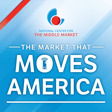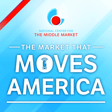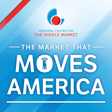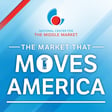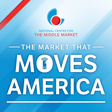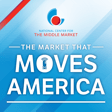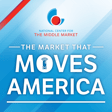Become a Creator today!Start creating today - Share your story with the world!
Start for free
00:00:00
00:00:01

Maximizing Business Performance Through Digital Transformation
As one of the world’s largest financial services companies, VISA helps middle market companies manage their own digital transformation in the payments space through collaborations with partners in fintech. Leigh Radtke, Vice President of North America Product at Visa Business Solutions, discusses ways middle market businesses can capitalize on digital solutions to maximize their business performance.
VISA Business Solutions, a division of VISA, helps connect businesses to a secure, global network of platforms, products, and services—no matter where you are on your business journey.
Transcript
Introduction to 'The Market That Moves America'
00:00:05
Speaker
Welcome to The Market That Moves America, a podcast from the National Center for the Middle Market. The center is the leading source of knowledge, leadership and innovative research on the middle market economy. Throughout our podcast, we will feature middle market leaders and stakeholders to hear their real world perspectives on trends and emerging issues.
Visa's Role in Digital Transformation
00:00:24
Speaker
Visa, a world leader in digital payments, helping to connect the world through the most innovative, convenient, reliable and secure payments network,
00:00:31
Speaker
is committed to helping middle market companies manage their own digital transformation in the payment space. And we'll discuss further in this episode of The Market That Moves America. Welcome to The Market That Moves America. Today's episode is a discussion about digitizing the payment space for middle market companies.
00:00:55
Speaker
The fact that there are so many of these businesses still utilizing paper checks when there are more efficient, accurate, and timely processes available is a great chance for us to talk about managing that opportunity.
00:01:08
Speaker
which could involve increased working capital and efficiency, especially as a lot of these companies are facing an inflationary and continually rising interest environment.
Meet Lee Radke – Career Insights and Visa's Digital Solutions
00:01:20
Speaker
So I'm pleased to be joined today by Lee Radke. Lee is the Vice President of North America Product at Visa Business Solutions. Welcome, Lee. Thanks, Doug. Great to be here. Great to be chatting with you again.
00:01:34
Speaker
Yeah, great. I'm looking forward to this. So why don't we, if we could just start, tell us a little bit about your background, your career, and then currently what your role entails at Visa. Yeah, you sort of hinted at payments really being about a shift from paper to digital. I mean, think about it even in our personal lives. You're shifting
00:01:59
Speaker
cash to a credit card or a debit card or something on your phone to pay. So in terms of my background, I actually had exposure for this concept from paper to digital very early on.
00:02:18
Speaker
So my first job out of college was actually was with, I don't know if we've ever, you and I have known each other a long time. I don't know if we've ever really talked about this, but my first job out of college was with a government contractor. And my first project was helping the Department of Defense shift their paper contracts
00:02:39
Speaker
So think about the army buying supplies or paying for services, and all of that had to be on paper. It was all paper contracts. And my first job out of college was really helping that shift, helping the Department of Defense shift from paper contracting, and this is going to date me a bit, but to this new thing called a computer.
00:03:07
Speaker
And so from there, my career really has followed the arc of innovation.
00:03:17
Speaker
I've been able to bring the first of its kind products into the market. I did a stint, for instance, at one of the first bill pay startups. Back when everyone was in our personal lives, we were all still using a checkbook and getting used to this thing called the Internet. I was designing a web app so customers could pay for their phone services online.
00:03:45
Speaker
And then from there, I went to a company that asked me to create a web app so that companies could receive their credit card statements and then pay those statements online. And that's the first time that I really discovered that when companies pay for things like plane tickets or office furniture, or they take clients to dinner, they pay for janitorial services,
00:04:13
Speaker
that it can get complicated. It's more complicated. It's similar to, but more complicated than what we deal with in our consumer lives. And I can explain that a little bit more. But just for your listeners, in case it's not known, there's an entire industry
00:04:34
Speaker
that is made up of tech and financial services companies that do nothing but help companies make and receive payments in a digital way. And I was fortunate enough to land at Visa 12 years ago, Visa trusted network, world leader in digital payments. And Visa, overall, we work to remove barriers and connect people in global economies.
00:05:01
Speaker
to uplift everyone everywhere by being the best way to pay and be paid. If you look at our website, that's what you would see. Well, that purpose includes uplifting businesses.
00:05:14
Speaker
of all sizes as well. And so my role at Visa is all about leading a team of product and solutions experts who do this in the US and Canada. So what we do is we really get to understand businesses and what their needs are, whether they're small or they're midsize or they're large. And then we help them grow by removing barriers and delivering digital payment solutions.
00:05:43
Speaker
Got it. So I can certainly vouch for the comment you made about the ecosystem. Cause you and I have presented together at a few of those conferences where you've got a lot of the partners in the room and a lot of the providers. So, um, quickly, uh, I think you had told me where your career had started, but back to that government process, was that pretty challenging because I think a lot of people associate government with paperwork, bureaucracy, like making things difficult.
Managing Change in Digital Transitions
00:06:13
Speaker
Was that an easy sell to transition over to digital payments or was that a difficult thing? Well, I wouldn't, I wouldn't, um, I would say that human nature in general is, is sort of resistant to change. Right. So I wouldn't, I wouldn't characterize it. I mean, you're right. You know, there's certainly a lot of, uh, paperwork when it comes to government, but there's a lot of paperwork, you know, in our personal lives and business lives, one of the,
00:06:42
Speaker
One of the really fortunate takeaways from me from that experience was I learned about change management. I learned, I mean, people are people, right? It doesn't matter if it's government employees or if it's employees of a business. If you're used to doing something a certain way,
00:07:08
Speaker
And now you've got to think about a different way to do it, or now you have to learn a new system to do it, there is likely to be some level of resistance. And part of that role that I had, that job that I had was not only putting the system into
00:07:29
Speaker
say a contracting office at an army post, but then I would stay and I would train the staff. And one of the things I learned is that you have the same makeup of people no matter what the situation is. So no matter what location I was in,
00:07:45
Speaker
I always found that there were people that were resistant to change and then there was a group of people that was excited about it and a group of people that was buying into it and a group of people that were afraid of it or pushing back. And so those are core themes that I've been able to bring all the way into where I am now, like the payments world and convincing companies
00:08:11
Speaker
to shift the way that they're currently making payments or receiving payments. Yeah. Yeah. That's a great segue because one of the questions I had for you was, so you said human
Tech Challenges for Middle Market Companies
00:08:24
Speaker
nature. I mean, I get it. What are some of the other within companies, for instance, like what are some of the barriers or misconceptions about making this switch? I mean, is it just
00:08:35
Speaker
This is a lack of understanding or knowledge or do you think there are legitimate concerns around security or do you think it's really just like I've been doing it this way for a long time and I'm comfortable and change makes me nervous.
00:08:49
Speaker
I think it's a mix of a lot of different things. I mean, it is everything from, well, think about the middle market, Doug, right? Everything you and I know about the middle market, these companies have been around for 20 or 30 years. So what comes with that are very entrenched processes and systems. And then to be fair, the middle market
00:09:18
Speaker
It is not as well. It's not as above the radar, right? It's why you, you know, why you lead the national center for the middle market. Like the middle market is not always above the radar. And so there are technology.
00:09:33
Speaker
Historically, especially, there have been technology solutions, say, accounting systems that are really dialed in for small businesses. And then you've got a set of business systems, maybe customer relationship management systems or ERP systems that are really dialed in for the large market.
00:09:57
Speaker
But until recently, and we see it now more than ever, until recently, there really haven't been technology solutions that meet the specific needs of middle market companies. And so in addition, just sort of like that human nature and that resistance to change, you've got, you know, I don't know that the middle market, to be fair, has always had the right solutions to choose from.
Opportunities in Digital Payment Solutions
00:10:28
Speaker
Right. Yeah. We see that quite a bit across different platforms, as you mentioned. So when you or members of your team get a chance to meet with some of these companies, and I assume it's mainly like CFO type roles or treasurers, when you sit down with these folks, you've got some great stories that you've shared over the years. How does that conversation go or what are some of the opportunities that you talk about in terms of making this switch?
00:10:57
Speaker
Because I know there's a great story you tell about a CFO or a treasurer that just spent an hour signing checks while you talked about digital payments. I love that one. Yeah. Well, I'll tell it again. It's one of my favorite stories that, I mean, first of all, the best way for us to really understand the needs of these companies is to go sit with them.
00:11:19
Speaker
I mean, we do research surveys, but when you go actually sit and talk with middle market companies, you really sort of walk it with them. And so I had a good friend named Diane, who was a controller at the time for a hundred million dollar irrigation supply company in Denver. So it's a company that's, you know, they're selling sprinkler systems to landscapers and contractors.
00:11:45
Speaker
And so I spent a day, she let me spend a day at her office really understanding their processes. And I sat with her while she signed, she said, you've come on the right day. She had a stack of 200 checks in front of her and she's signing these checks telling me her vision, like how she really would love to be able to pay.
00:12:12
Speaker
her suppliers in a way that is, you know, where it's going to get her out of signing checks. It's going to be more automated. So she actually had three things that she wanted. One was an easier way to pay her suppliers without having to do anything manually. The other was an easier way for her to receive payments
00:12:39
Speaker
from her customers. And then the third thing was for her associate, there was a sales team. And the sales team was traveling around to clients, you know, they were driving to different client sites, they were taking their clients to dinner, and the sales team, they were all using their personal
00:13:00
Speaker
cards for client expenses, business-related expenses, which meant that Diane had to have someone dedicated on her team to go around each week and collect receipts from everyone on the sales team and then key enter those, type all of the information about those receipts into an Excel spreadsheet so that they could figure out who was spending
00:13:29
Speaker
who was spending what, and those three key needs, those are what we hear and solve for on a regular basis. Right. As you said, we know these companies in many cases have limited resources. They have less headcount, they have smaller accounting departments, finance departments. The fact that somebody was keying these in manually,
00:13:56
Speaker
is a little bit crazy to me to think about. And the irony there is that a card solution, a payment solution that is dialed in for a middle market business will take all of that work
00:14:16
Speaker
off of the company because all of the purchase data, any purchase you make with a card product is going to come automatically into your business systems. And so really, ultimately, it does save a lot more time. The challenge is that middle market companies, well, A, they need to know these solutions are out there,
Benefits of Digital Payments
00:14:44
Speaker
And B, they don't have a lot of time to assess a lot of different solutions and compare. And then as you well know, they're lean too, right? These are not companies that have a technical team. They can't think about
00:15:08
Speaker
anything that's going to require any level of programming or IT resources has to be really simple. Sure. Yeah. Turnkey type solutions. If we stick to this example of Diane, did she make the switch? I assume you were able to work with her.
00:15:29
Speaker
Well, she left that company shortly thereafter, but it's companies like Diane's that we're solving for every day with the partners that we work. Our partners are banks, right? So we offer solutions to banks and then our bank partners are offering their solutions to companies just like Diane's.
00:15:57
Speaker
And so what do you see happen when these solutions start to be put into place? I mean, what are some of the benefits or results that you've seen from that switch? You mentioned three of the key things around speed efficiency, less human interaction, like resource constraints. What are some other benefits that you see?
00:16:22
Speaker
Yeah, so if we just break them down, I like where you're going with that. So we just sort of break them down into the benefits of each one of those things. So making payments to suppliers once we're able to help a company
00:16:41
Speaker
Remove that term manual process it takes away all that all of that pain right it takes a long takes a long time it's really inconvenient to write checks checks get lost in the mail or are you know potentially open to bad actors who are gonna you know.
00:17:04
Speaker
commit some sort of fraud with them. So that's removing checks is key. And it's also hard to figure out when you receive a check payment or you make a check payment, it's hard to tie that back to what you actually
00:17:18
Speaker
purchased and so by inserting inserting I'm gonna use a term here inserting a virtual card and all that means is it's Think about Diane's company, you know if they had a card product a credit card product built for businesses one of the uses one of the ways they could use that card product is they could take that
00:17:48
Speaker
card number that you know the number that appears on our physical cards there's a there's a digital version of those card numbers and you can apply that that's what a virtual card is you can apply it
00:18:02
Speaker
to pay an invoice. And a virtual card is really sort of locked in, dialed in to that payment. So if I'm gonna buy plastic from Doug's manufacturing, I can pay you Doug with a virtual card and I can say it's for Doug's manufacturing, it's for this exact dollar amount and it can only be used in a certain period of time.
00:18:30
Speaker
So not only do we help make payments to suppliers easier,
00:18:39
Speaker
and it removes that sort of manual, like that pain of all of the manual check writing, but it also makes that payment more secure. And then you think about Diane, right? She's a controller, she's managing money in and money out. Well, what a virtual card does for her is it allows her to pay her supplier earlier than she normally would
00:19:09
Speaker
because Diane doesn't actually have to pay.
00:19:13
Speaker
her statement, her credit card statement to her paying for 30 or 45 days. So if she's paying her supplier earlier, that means that her supplier can then turn around and buy what they need to build their products. So in that way, it's not only helping Diane's company, it's helping the entire supply chain. So those are key benefits that are just tied to
00:19:43
Speaker
virtual cards, which is one way to move to a more digital process in terms of making payments. And then accepting payments, I talked about she's able to pay her supplier earlier. So when Diane's with a supplier and when her clients are paying her, if they're paying her on a virtual card, she's probably going to get paid earlier.
00:20:10
Speaker
And that allows her to use that cash. So you had mentioned working capital and cashflow, and that really is at the center of what we're solving for here.
Technology Adoption and Generational Shifts
00:20:23
Speaker
Yeah. Cash is king for a lot of mid-sized businesses. It's kind of what they live and die on.
00:20:29
Speaker
So if we step back a little bit more broadly, we've already talked a little bit about a lot of the resource constraints that these mid-sized companies have. What are your thoughts on how they should think about just technology utilization in general? Because I've come across instances where some are like, well, we've had some homegrown systems or we've done some conversion, but we've started very small and added on things over the years.
00:20:58
Speaker
Or there's an approach that could be like, okay, we found a platform, even though it's big, we're just gonna go for it and create a lot of dramatic change. I've been part of parts of those at a Fortune 500 company and at Ohio State University. And even for big organizations, those are very painful. So what are some of your thoughts on kind of making that decision, like small and add on or go big?
00:21:27
Speaker
Yeah. It makes me think about another story, actually. It was an engineering firm. They were probably north of $50 million in annual revenue that I talked with.
00:21:41
Speaker
a few years ago and they were on a really small accounting, they were on an accounting package that was really meant for smaller companies and they were kind of kicked off of the accounting package because their volume had grown. So they had so many files and so much information and data that was going into that accounting package that they knew they had to find another and so they jumped to
00:22:09
Speaker
another business system, and it's exactly what you're talking about, where the small system, they outgrew it, but then the other system they went to was so disruptive for them to try to put into their business that they were left with no answer.
00:22:35
Speaker
I look around, I see all of the innovation in the marketplace. I see what our technology partners are doing. We call them FinTech partners, financial services, technology partners, FinTech partners. I see what they're doing. I see what they're coming up with. I see what we're doing at Visa. And so what I would say to middle market companies is
00:23:00
Speaker
Don't sacrifice, don't feel like you have to bring on a solution that you might grow out of and don't feel like you've got to
00:23:11
Speaker
kind of reach to a rung that's maybe a little bit too high for you and might be fully disruptive for your company to take on. And then an interesting sort of side note on all of this is at the center, you guys have talked a lot about how these middle market companies are about to change ownership.
00:23:38
Speaker
So that's a factor too, right? Because you've got potentially the millennial or Gen Z generation coming up.
00:23:48
Speaker
they're going to be a lot more digitally savvy. So point one is technology innovation is at a point where there are more systems now than I've ever seen before available for middle market companies to help streamline their operations.
Strategic Focus on Middle Market
00:24:10
Speaker
So don't settle.
00:24:11
Speaker
The second is, I do think that as more and more companies change ownership, sort of tap into the digital natives as you were, like the generations that grew up with digital solutions, that it's going to be a lot easier for middle market companies to make that shift. Yeah, that's great.
00:24:34
Speaker
We've been working together in partnership for about two years, but you and I have been talking long before that. I get the sense that it was you that you recognize the middle market as a priority segment, and then you drove that message throughout Visa, maybe I'm wrong, you can correct me if that's not the case. But is it really that sweet spot that
00:25:01
Speaker
that elevated the middle market as a really good opportunity to go after because of these gaps and maybe like the right scaling of the solutions that were available. What was it that made it so appealing to really focus on midsize companies? Yeah. I mean, Visa is interested in the middle market for many of the same reasons that the center is focused on these companies.
00:25:26
Speaker
We're talking about 220,000 companies that are so important and impactful for our economy and responsible for driving a third of US economic productivity. We look at the purchasing parity of those 220,000 companies and it's the equivalent to the fifth largest economy, which I think right now is the
00:25:55
Speaker
is the UK economy. And so we think about that. We think about our clients. Our clients are all serving middle market clients. In fact, if you looked at our clients collectively, 57% of middle market companies are using payment products offered through Visa.
00:26:20
Speaker
bank clients. And so really compelling market opportunity with a set of
00:26:30
Speaker
very unique needs that, like we've talked about. They don't look like small businesses. They don't look like large corporates. So those two things together, tapping into that sort of $7 trillion in B2B purchasing, but doing it with the right solutions
00:26:52
Speaker
so that these companies have the most, we can deliver the most value right back to, we're all about helping businesses and companies and people sort of grow and thrive. So in order to do that with the middle market, we really need an investment and kind of a dedicated focus so that we can help our clients serve their clients, which is the middle market.
00:27:18
Speaker
Yeah, sure. So I guess I'll just, I mean, we could go on for hours. I mean, you and I talk about this stuff day in and day out. So it's, it's great. But I'll just kind of leave with one final question. What advice would you give to middle market leaders who might be struggling right now or they want to try to make a change, but they don't know where to start.
Advice for Middle Market Leaders
00:27:40
Speaker
Should they talk to their bank, their financial institution? Like where's the right place for them to go?
00:27:46
Speaker
to talk about a lot of these great opportunities that you mentioned today. Yeah, talk to your bank. Banks are offering these solutions. How do I make solutions to make payments easier to supply or solutions to receive payments from customers?
00:28:03
Speaker
and solutions to help you make purchases in, you know, whether they're playing tickets or solutions for your sales teams, talk to your bank. You could also go to visa.com and check out the Visa Business Solutions web pages on visa.com. Perfect.
00:28:25
Speaker
Well, that's great. Lee, I really appreciate time. Like I said, we could keep going on for hours talking about this stuff, but great insights really value your partnership. And it's been great for the center working with Visa. We've gained so much in just a short few years together. So again, thanks for joining the podcast today. Thanks, Doug. And same here, we really appreciate the partnership with the National Center for the Middle Market.
00:28:54
Speaker
Thanks for the time today. Yeah, thanks. As Lee said, to learn more about Visa Business Solutions, you can visit the Visa website and just look up Visa Business Solutions and they've got a whole wealth of information out there. So again, thanks Lee and thanks everybody for joining us today. Thank you for listening to The Market That Moves America. Never miss a new episode by subscribing anywhere podcasts can be found. You can also subscribe to our email newsletter at middlemarketcenter.org.
